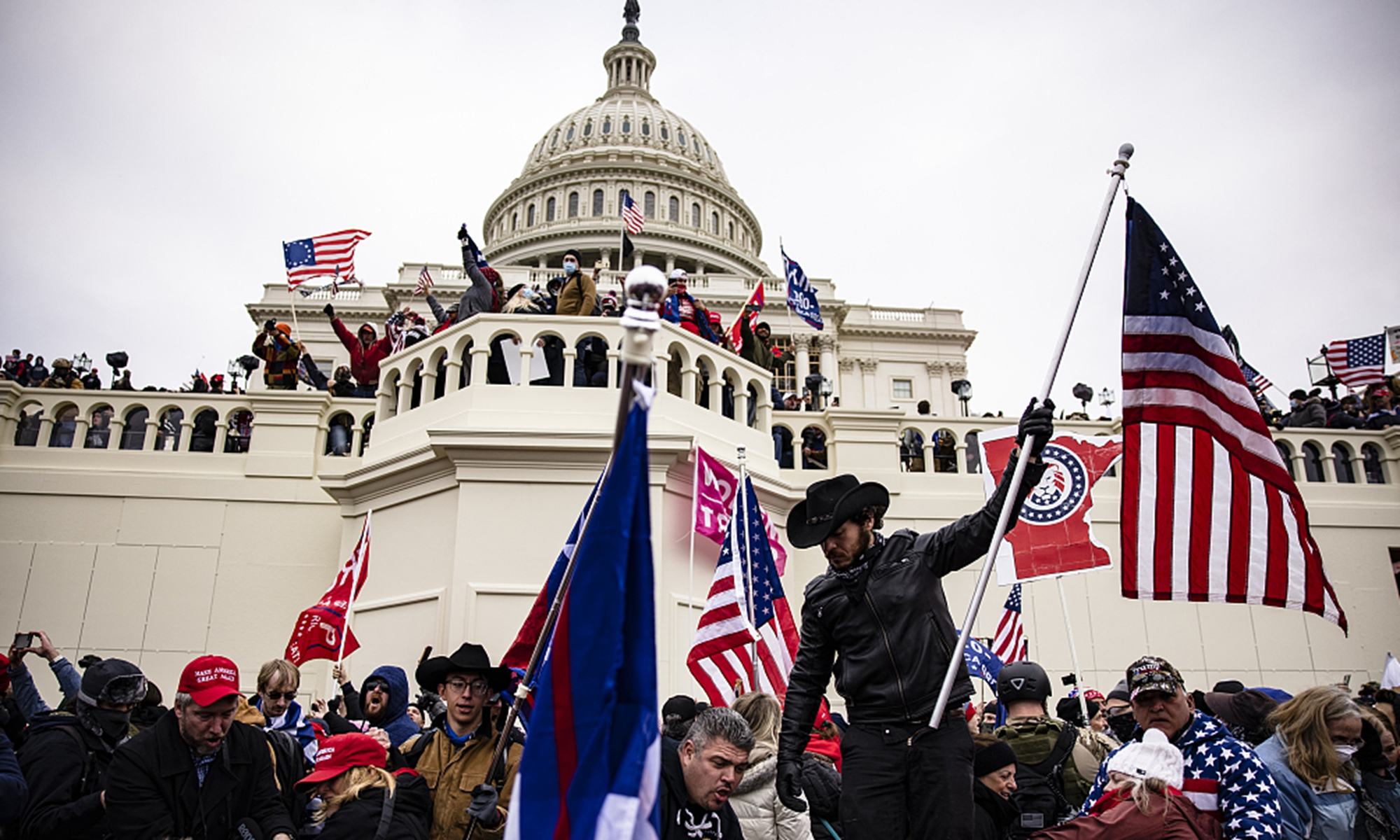
Pro-Trump supporters storm the US Capitol following a rally with President Donald Trump on January 6, 2021 in Washington, DC. Trump supporters gathered in the nation's capital to protest the ratification of President-elect Joe Biden's Electoral College victory over President Trump in the 2020 election. Photo: Samuel Corum/Getty Images/VCG
When people were shocked by the European debt crisis triggered by the 2008 financial crisis, no one dared to predict that it was just a start of the tests the West would have to deal with in the 21st century.
In just about eight years' time, singled out by the Brexit referendum in 2016 and election of Donald Trump in the same year, populism has hit hard two of the most important Western countries.
Only two weeks before Trump was supposed to leave the Oval Office, a serious riot that normally happens only in third-world countries saw the US Capitol Hill stormed. This was jaw-dropping scary. However, the West felt relieved with the Joe Biden administration finally in. They believe the past four years of shattered democracy are over and now things will be revitalized.
But just as the Biden administration gets itself primed to fight the COVID-19 epidemic, political uncertainties took place in Myanmar, a country praised by the West as a model of democratic transformation.
This will be a test for the Biden administration, as it demonstrates the worldwide decline of Western-styled political models.
The late American political scientist Samuel Huntington said in 1991 that, "only Western culture provides a suitable base for the development of democratic institutions and, consequently, that democracy is largely inappropriate for non-Western societies."
Such conclusions might need to be adjusted after so many changes have been witnessed in the 21st century: In addition to being inappropriate for non-Western countries, Western-styled democracy itself is malfunctioning and hard to sustain in its very home.
The Western system has prominent problem and the reason is clear at a glance. For example, due to "one person, one vote," politicians have surrendered to capital groups and therefore have lost execution abilities. Amid the COVID-19 pandemic, the West has been very slow to take measures against the virus. Moreover, the final winner of elections is not necessarily the most competent. Many factors including skin colors, religious beliefs, and genders might affect the results - as populism is showing with attacks that divide these elements.
The wealth gap has been widening in the West too. The sharp shrinkage of the middle class and changes in ethnic makeups of societies have made it possible for populism to prevail. The Western system not only provides favorable conditions for populism to spread, but also paves the way for populist leaders to get involved in politics, and even become the head of a state.
In the Western system, the opposition party plays a role to supervise and correct errors. It is designed so to promote the country's reform and development. But if an opposition party wants to take power, it can only look forward to finding mistakes or failures from the ruling party. As a result, the opposition opposes with the sole purpose of opposing.
During the process, political parties put their own interests above national interests. That's why we have witnessed government shutdowns in the US time and again; and why major policies cannot be introduced or cannot be efficiently implemented. This is also why the debate over a normal approach to fight COVID-19 - wearing facial masks - has also evolved into such a bipartisan fight.
All those stemmed from deep-seated institutional structural problems, not from individual's responsibility. The West has attributed the US failed response to epidemic by blaming Trump. There is no Trump in Europe, yet the continent is also a badly hit region.
Against this backdrop, the West still wants to continue playing the role of the so-called beacon of democracy, trying to intervene in Myanmar's domestic affairs. It still does not reflect upon what went wrong in its own system. There has also been no reflection on why developing countries, including Myanmar, which tried to step on the Western democratic path, resulted in only turmoil rather than peace and development. Before the incident in Myanmar, the situation in Egypt, Libya, Thailand, Afghanistan, Iraq and numerous other developing countries also serve as proof.
No system is perfect. But only those with the capability to reflect and to right the wrong will keep pace with the times. However, the West has lost the ability. The challenge which the West has to confront now is just the beginning. The collapse of the entire West may be yet to come.
The author is a research fellow at the China Institute, Fudan University. opinion@globaltimes.com.cn




